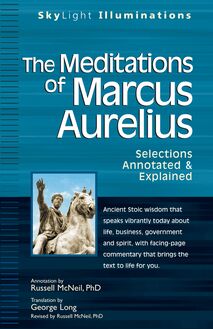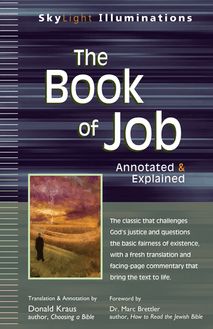The Hebrew Prophets , livre ebook
205
pages
English
Ebooks
2011
Vous pourrez modifier la taille du texte de cet ouvrage
Obtenez un accès à la bibliothèque pour le consulter en ligne En savoir plus
Découvre YouScribe et accède à tout notre catalogue !
Découvre YouScribe et accède à tout notre catalogue !
205
pages
English
Ebooks
2011
Vous pourrez modifier la taille du texte de cet ouvrage
Obtenez un accès à la bibliothèque pour le consulter en ligne En savoir plus
Publié par
Date de parution
04 avril 2011
Nombre de lectures
0
EAN13
9781594733420
Langue
English
Fresh translation and facing-page annotations bring the compelling wisdom of the Hebrew prophets to life.
Hundreds of commentaries and dozens of Bible translations make the Hebrew prophets available to modern-day readers, but most often these sources focus on history or apologetics, losing the reader who is searching for spiritual insight.
The Hebrew Prophets: Selections Annotated & Explained makes the wisdom of these timeless teachers available to readers with no previous knowledge of the prophets. With fresh, contemporary commentary, Rami Shapiro reveals the central themes covered by all the prophets: moving from ignorance to wisdom, injustice to justice, cruelty to compassion, and despair to joy.
This unique look at the Hebrew Prophets sharpens the personal nature of their message and highlights their critique of the spiritual errors we all face in life, challenging readers to correct those errors and experience a life of awakening and joy.
Publié par
Date de parution
04 avril 2011
EAN13
9781594733420
Langue
English
Books in the SkyLight Illuminations Series
The Art of War-Spirituality for Conflict: Annotated & Explained
Bhagavad Gita: Annotated & Explained
The Book of Mormon: Selections Annotated & Explained
Celtic Christian Spirituality: Essential Writings-Annotated & Explained
Confucius, the Analects: The Path of the Sage-Selections Annotated & Explained
Dhammapada: Annotated & Explained
The Divine Feminine in Biblical Wisdom Literature: Selections Annotated & Explained
Ecclesiastes: Annotated & Explained
The End of Days: Essential Selections from Apocalyptic Texts-Annotated & Explained
Ethics of the Sages: Pirke Avot -Annotated & Explained
Ghazali on the Principles of Islamic Spirituality: Selections from Forty Foundations of Religion -Annotated & Explained
Gnostic Writings on the Soul: Annotated & Explained
The Gospel of Philip: Annotated & Explained
The Gospel of Thomas: Annotated & Explained
Hasidic Tales: Annotated & Explained
The Hebrew Prophets: Selections Annotated & Explained
The Hidden Gospel of Matthew: Annotated & Explained
The Infancy Gospels of Jesus: Apocryphal Tales from the Childhoods of Mary and Jesus-Annotated & Explained
The Lost Sayings of Jesus: Teachings from Ancient Christian, Jewish, Gnostic, and Islamic Sources-Annotated & Explained
The Meditations of Marcus Aurelius: Selections Annotated & Explained
Native American Stories of the Sacred: Annotated & Explained
Philokalia: The Eastern Christian Spiritual Texts-Annotated & Explained
The Qur an and Sayings of Prophet Muhammad: Selections Annotated & Explained
Rumi and Islam: Selections from His Stories, Poems, and Discourses-Annotated & Explained
The Sacred Writings of Paul: Selections Annotated & Explained
Saint Augustine of Hippo: Selections from Confessions and Other Essential Writings-Annotated & Explained
St. Ignatius Loyola-The Spiritual Writings: Selections Annotated & Explained
The Secret Book of John: The Gnostic Gospel-Annotated & Explained
Selections from the Gospel of Sri Ramakrishna: Annotated & Explained
Sex Texts from the Bible: Selections Annotated & Explained
Spiritual Writings on Mary: Annotated & Explained
Tanya, the Masterpiece of Hasidic Wisdom: Selections Annotated & Explained
Tao Te Ching: Annotated & Explained
The Way of a Pilgrim: The Jesus Prayer Journey-Annotated & Explained
Zohar: Annotated & Explained
Contents
Foreword by Rabbi Zalman Schachter-Shalomi
Preface
Acknowledgments
A Note on Translation
Introduction
Brief Biographies of the Hebrew Prophets
The Mission of the Prophets
From Ignorance … … to Truth
From Injustice … … to Justice
From Despair … … to Joy
Afterword
Notes
Suggestions for Further Reading
About SkyLight Paths
Copyright
Foreword: The Prophet of Bellevue
Zalman Schachter-Shalomi
Around 1962 I was reading the New York edition of the Jewish Post and came across a headline that read, These Words Got a Person Committed to Bellevue Hospital. Inside was reprinted a little leaflet that someone had written and distributed in mimeographed copies. It was an indictment of modern Jews and Judaism, which read, You have fancy synagogues, but there is no God there…. You are dressing your daughters in such a way that they will have a real difficulty in being chaste…. You claim to honor me, but you honor not the needs of the poor. Here was Isaiah s Is this the fast that I have chosen in modern language from a man called Eliezer, the Servant of the Lord, a modern Jewish prophet.
I was so interested in this man that I called Charlie Roth, who had written the article for the Jewish Post , and asked him some questions about this Eliezer. Charlie s article told of how he had bailed Eliezer out of Bellevue mental hospital, and I wanted to know more. I asked him, What s the story with this guy?
He has been told by God that he must do this work and speak these words, Charlie responded.
What had happened was this: One day Eliezer was standing in front of Congregation Emanu-El in New York distributing his leaflets. With each one he gave away he would say, Please don t litter by throwing this in the street. If you don t want it, just hand it back to me. At first the people at Congregation Emanu-El figured he was a Christian and wondered if they should even bother with him. But as they didn t see anything about Jesus in the material, they suspected he might be Jewish and took one of the fliers to the rabbi. The rabbi read it and was incensed by it. The people of Congregation Emanu-El called the police, and the police called an ambulance from Bellevue.
The ambulance arrived and Eliezer refused to get in, saying, This is not what God has asked me to do. They picked him up bodily and put him in the ambulance. That was the first day of Rosh HaShannah.
For two days he neither spoke nor took food from his jailors. On the second evening Eliezer finally broke his silence by saying, I m entitled to a phone call. They asked him, What s the number? We ll dial it for you. He closed his eyes for a moment and then gave them the contact information for Charlie Roth of the Jewish Post . They dialed the telephone number and handed the phone to Eliezer, who said, Hello, I am Eliezer, the Servant of the Lord. I am here in Bellevue hospital for passing out leaflets in front of Congregation Emanu-El. Until now I have not spoken because it was yontif (a holy day), but now that yontif is over I have had them call your number. Would you please come and get me?
Charlie had no idea who this man was or any idea as to how he had gotten his number, but he got on his Vespa scooter and went over to Bellevue hospital to pick him up. There, Charlie listened to Eliezer s story then took him home to his apartment and fed him. After that, Eliezer left.
Several days later, on Yom Kippur, he showed up again, this time in front of the Society for the Advancement of Judaism, the Reconstructionist synagogue. Again, he handed someone a leaflet and they took it inside to show the rabbi. This time the rabbi was Mordechai Kaplan, the founder of Reconstructionism. Should we call the police? asked the person who presented the leaflet to the rabbi.
No, no, he answered. Please ask this gentleman to come in and read his pamphlet from the pulpit. But when they asked Eliezer to read the material from the pulpit, he said, That is not what God asked me to do. You read it from the pulpit if you want.
I was told that after this event he left New York and went back to Chicago, where he lived. At that time, my sister was living in Chicago and I asked her if, by chance, she knew Eliezer, because his family name was Schachter, our own family name. Eliezer! He is our roofer, our tinsmith, she said. I asked her to arrange a meeting with him the next time I was in Chicago, so I could speak with him. My sister agreed.
So the next time I was in Chicago I drove to his address, and his mother let me in. Immediately I saw Eliezer standing over a homeless person whom he had just fed, and his mother, one of those wonderful holy ladies, sweet and pious, said to me, My kusher zin , my kosher son, he is such a kind person. Then Eliezer turned to me and said, You wait for me. I have to feed this person. When he finished with the man, he came over to me. Give him ten dollars, Eliezer instructed me. What was I going to do, argue with him? I gave the man ten dollars, and then Eliezer sat down with me to find out what I wanted. I asked him if he would be willing to come and speak to some friends of mine. He agreed.
When he visited we asked him a few questions. How did this happen to you? someone asked.
One day, God spoke to me and said, Take down this dictation. So I took down the dictation. Then God said, I want you to publicize this. Well, I said, you wanted me take down the dictation, I took down the dictation; more I can t do right now. The next day I got to work and someone said to me, Eliezer, I hear you need some typing done. So I realized I was trapped, and I gave her the dictation. On the next day she brought it back to me typed out. Just after that, another acquaintance came to me and said, I have a mimeograph machine and I understand that you need one. I realized that there was no avoiding this, and I have been doing this work ever since.
What is it like when God talks to you? someone asked Eliezer.
That is what every psychologist wants to know, he replied.
How do you know it s God and not the devil? someone else asked.
That s what every judge wants to know, he replied. He didn t answer any questions after that.
Was he a prophet? What can I say? He was a servant of the Lord and I really loved him in his humility and the way in which he saw himself as fully an instrument of God.
Preface
Do the Hebrew prophets matter? This is the first question you must ask yourself when deciding whether or not to read this book. If you say no, then there is no reason to proceed. If you say yes, you must then ask what your yes means.
Saying no to the prophets relegates them to the dustbin of history; affirming that there is nothing in their lives that speaks to your life, and therefore no reason to bother with them at all. While this is a legitimate position to take, it is also one I find less than convincing. For me the prophets are not only valuable, but critical. Their lives not only relate to mine; they challenge mine. The prophets reflected God s way in their own lives; that is, they stood in direct relation to God, experienced the essence of living in tune with godliness. They then spoke their truth, and in so doing allow me to see more clearly the truth and falsehood of my own experience.
Saying yes to the prophets places you in direct conversation with them. It allows the prophets to speak directly to you about your life right here, right now. This is the way the prophets contemporaries heard them. This is the way the prophets themselves expected to be heard. And this is the p














